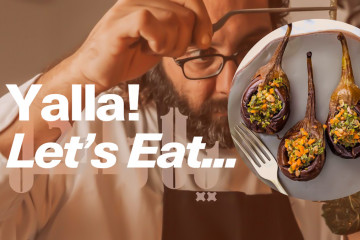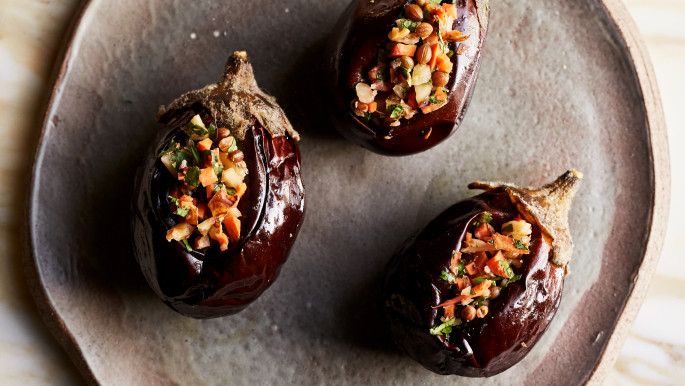
Chef Fadi Kattan's new restaurant Akub serves London a modern taste of Palestine

There's a bit of "sympathy capital" in bringing modern Palestinian cuisine to a place like London, says chef Fadi Kattan, 45, co-founder of Notting Hill's new fine-dining restaurant Akub.
"But I don't want people to come and eat at Akub because they're pro-Palestinian," he continues. "I want them to come and enjoy a meal."
"Near-perfect Palestinian cuisine," says Time Out magazine. "Something to be gripped tight and treasured," writes Jimi Famurewa, chief restaurant critic at London's Evening Standard newspaper. If these glowing reviews are anything to go by, Fadi need not worry about diners' enjoyment of Akub, which opened fully in mid-January.
A Franco-Palestinian from a Christian family, Fadi was born and raised in Bethlehem. He spent time training in France but was formed in his mother and maternal grandmother's kitchens. "I'm lucky to still be able to call my mother and be like, 'So, how do you do this recipe?' She laughs at, 'Why, you're gonna deconstruct that one now?'" he tells The New Arab by video call from Palestine.
"I take Palestinian traditional food and I either invent something inspired by it or I work on textures, presentation and tastes"
The chaos of Fawda
Akub isn't Fadi's first foray into the fine-dining business – but it is different. For starters, it has a menu. His Bethlehem eatery Fawda is not so orderly – as its name, meaning "chaos" in Arabic, suggests.
Diners at Fawda, which has yet to reopen after closing due to Covid, must wait and see what Fadi finds at the farmers' market each morning before they learn what's being served. Coming up with the day's dishes on the fly helped in designing Akub's menu.
"It formats the way you think very differently," says Fadi, who was in London for two-and-a-half weeks for Akub's opening and plans to be there to supervise every couple of months. He otherwise relies on "the magic of WhatsApp", starting work a few hours before the team and finishing when they do.
A modern taste of Palestine
The menu at Akub is a modern rendition of Palestinian cuisine. "I take Palestinian traditional food and I either invent something inspired by it or I work on textures, presentation and tastes," Fadi says, giving the example of mansaf.
The dish is typically served as a large tray filled with bread, rice, yoghurt and a "big chunk of lamb meat". But chez Akub the classic meal is compressed into crunchy balls. What started as something you'd tuck into around the family table can now be plated up for individual diners, though Fadi stresses the menu is still designed to allow sharing.
This transition from home to restaurant was influenced by France, where cuisine underwent a similar transformation. The French spirit also shines through in the importance Fadi attaches to the origins of food.
While Palestinians celebrate provenance, he says, they don't have official regional classifications for food and drink as France does. Three main divisions of historic Palestine were considered in developing Akub's menu: the coast, the inland and the desert.
No attention was paid to borders with modern-day Israel, formed on Palestinian land in 1948 alongside an ethnic cleansing campaign known as the Nakba, meaning "catastrophe" in Arabic. This history is physically visible at Akub, where keys standing in for lost Palestinian homes are stuck into walls.
The menu is about representing the three main divisions – which Fadi refers to as regions or "terroirs", loosely meaning environments – "regardless of where a line was drawn by whoever".
The hard yoghurt in the mansaf is laban jameed, which originates with the desert Bedouins. There's dagga ghazzawieh, a tomato salad from coastal Gaza, and cheese from Nablus in the inland. "We're producing it in-house in Akub with British milk, but it's Nabulsi," Fadi says.
Where's the akub?
One noticeably missing ingredient is akub, the thistle the restaurant takes its name from. Beloved to Palestinians and known in English as cardoon, Fadi has so far been unable to find a supplier.
"I think it's a beautiful flower. I also think it's a very engrained essence of what Palestinian cuisine is," he says. The Palestinian chef's grandmother didn't celebrate seasons like spring, summer and autumn but rather the season of akub, the season of the shrub mulukhiya and so on. He felt the restaurant's name would "really encompass… the richness of the Palestinian terroir".
Israeli authorities banned the foraging of akub in the West Bank and Israel in 2005, says Rabea Eghbariah, a lawyer for the Haifa-based legal centre Adalah which advocates for Palestinian rights. Following an intervention from the centre, he adds, in 2020 prosecutorial policies were changed to allow the picking of small quantities of the plant in specific areas.
The Israeli criminalisation of akub and the popular herb zaatar "embodies the loss of Palestinian control [over] the everyday activities of Palestinian life and the criminalisation of [the] Palestinian relationship to [the] land", Rabea says. It is "yet another attempt" at dispossession.
"Culinary appropriation [and] culinary whitewashing are unacceptable"
But Israeli restrictions aren't why Fadi's been unable to find a supplier. "I would not ship akub from Palestine to the UK anyway," he says. The restaurant's fresh produce all comes from the UK, except its aubergines, which are from mainland Europe.
"What do we chefs do? We work with products of nature. If we're not respectful of nature back it doesn't work," Fadi says. "I don't want to be using produce out of season coming from the other side of the world. I prefer not having a plane pollute the world because I'm getting… lamb from New Zealand."
'Culinary appropriation'
Another oft-discussed form of culinary disrespect is the appropriation of Palestinian food by Israeli restaurants and chefs. Was Fadi thinking about this when setting up shop in Britain? "Not when I opened up in London. It's something that's been on my mind since the day I started cooking. Culinary appropriation [and] culinary whitewashing are unacceptable."
The Palestinian cook says he doesn't "get it". "When you go to a restaurant that celebrates the origin of products – so you'll see people that use truffles from Alba [in Italy] and will say they come from Alba. And then it gets to a Palestinian product and it's mmh," he continues, gesturing to zip his lips.
"The culture of occupation… is not only about confiscating Palestinian land and confiscating Palestinian people's livelihoods. It's also about confiscating people's identities"
Fadi has no problem with Israeli chefs cooking hummus or the wheat grain freekeh, which Akub serves as a risotto. "Just say it's Palestinian," he urges, adding: "Don't say musabaha is Israeli," referring to chickpeas served swimming in a tahini sauce.
"The culture of occupation… is not only about confiscating Palestinian land and confiscating Palestinian people's livelihoods. It's also about confiscating people's identities," Fadi says. "You have a different political opinion – fine. [But] don't twist realities of history."
No political goal
There's clearly a charged atmosphere surrounding Palestinian food. But Fadi finds it "very disturbing" people paint Akub as having a political goal. "If they walked into a Spanish restaurant that's celebrating Spanish history and cuisine, they wouldn't think that it's political."
Akub sells Palestinian beer and wine and uses Palestinian-made plates. Its diners are greeted outside by an olive tree – a well-known symbol of Palestinians' determination to remain on their land. Fadi rejects the idea the tree's presence is political. "I come from a land where we've actually had olive trees for 3,000 years."
The main goal is to "celebrate Palestinian cuisine's diversity" and the restaurant has a multicultural clientele to match. "We're serving approximately 140 people a day. I could maybe name 140 nationalities we've served," Fadi says.
Halal
Even so, the restaurant has faced criticism online for not serving halal meat. Akub uses a small butcher which in turn works with "very small" British farms that have a "very high-quality" product, Fadi says. "I did not find a halal equivalent." Those observing a halal diet can eat the vast majority of dishes provided they avoid those containing meat or alcohol – an ingredient in one of the two fish options.
Some social media users were upset, however, saying visibly Muslim diners hadn't been told the meat wasn't halal. "If you walk into Akub, is it my job to guess what your faith is? And even if I know what your faith is, is it my job to tell you what you're allowed or not allowed to eat?" Fadi asks. "You could be a Muslim that drinks [alcohol]. You could be a Hindu that eats beef. I'm not a religious authority – I'm a restaurant."
The Palestinian chef adds Akub caters to everyone, including vegetarians and vegans. He notes there's an option on the online booking portal to specify halal and other dietary requirements.
Asked if it would be a good idea to mention the meat isn't halal on the restaurant's website, Fadi says: "Why would I put what it's not?" He points out London is home not only to a large Muslim community but also many Hindus and Buddhists – religious groups with their own dietary restrictions. "Should I say which one is not suitable for Hindus? Or which one is not suitable for Jains? Or which one…?" he asks.
He also views the ordering process differently. "I can tell you… 'You can't eat this and that and that,' or I can tell you, 'Oh today, you can have this and this and that and that.' You're saying the same thing, but one of them is being very positive."
Whatever your requirements, it's always good to hear what the chef likes. So, what's Fadi's favourite dish at Akub? "That is an unfair question that I refuse to answer, especially at this time of day where I am getting hungry – and I would tell you, all of them," he says with a laugh at around 1:20pm in Palestine.
"The nice thing about it is because it's a sharing concept… I can allow myself to say all of them, but it would just have to be quite a big table."
Featured image credit: Matthew Hague
Akub's address is 27 Uxbridge Street, London, W8 7TQ. The restaurant's menu can be viewed on its website.
Nick McAlpin is a journalist who has worked at The New Arab since March 2021. He holds a master's degree in social anthropology and a BA in French and Arabic. He lived in Jordan for a year during his undergraduate studies. Nick started his journalism career as a freelancer in 2019.
Follow him on Twitter: @NickGMcAlpin




![President Pezeshkian has denounced Israel's attacks on Lebanon [Getty]](/sites/default/files/styles/image_684x385/public/2173482924.jpeg?h=a5f2f23a&itok=q3evVtko)



 Follow the Middle East's top stories in English at The New Arab on Google News
Follow the Middle East's top stories in English at The New Arab on Google News


